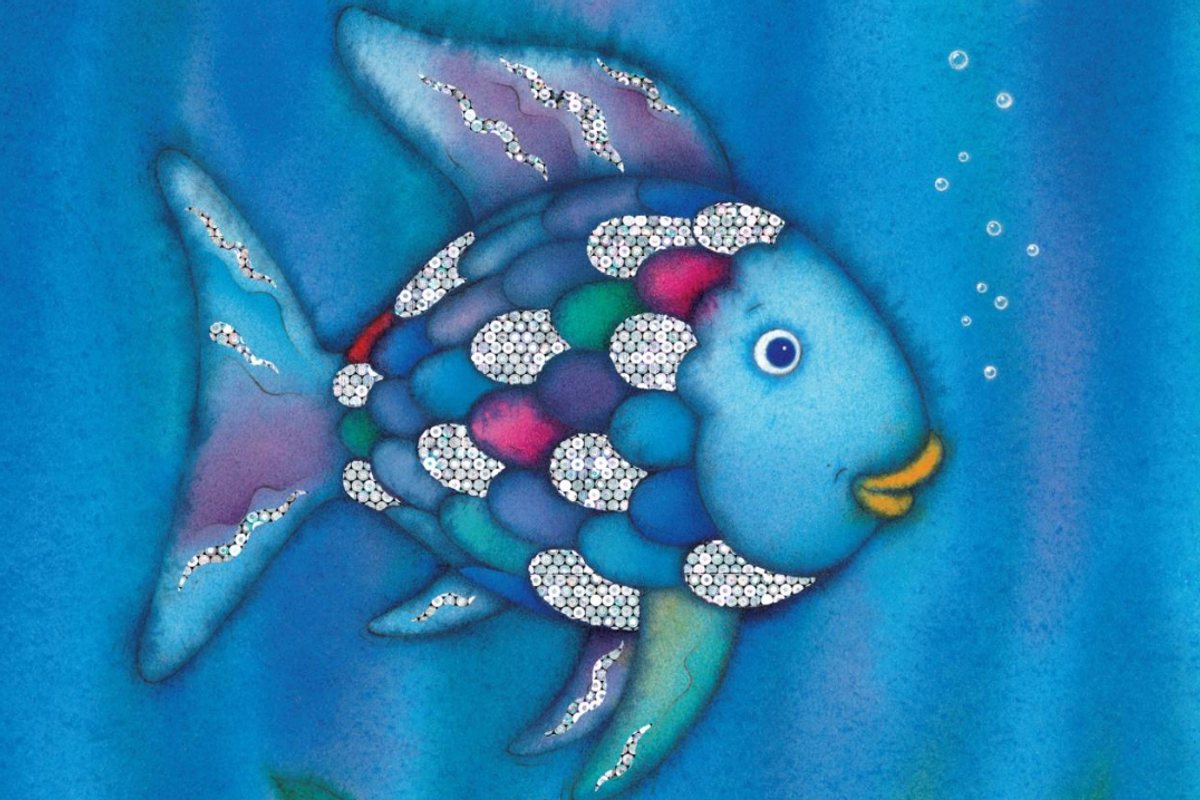Fifth-grade teacher explains why he thinks the classic kid's book 'Rainbow Fish' isn't great
Sorry millennials, we need to rethink your favorite book.
The cover of "Rainbow Fish."
Few children’s books are as deeply ingrained into the collective millennial psyche as “Rainbow Fish.” In addition to selling a gazillion copies, it has spawned counting books, board books of opposites, hand puppets, and sequels such as "Rainbow Fish to the Rescue!" and "Rainbow Fish Finds His Way." What’s not to love about those oh-so sparkling rainbow scales and heartwarming lesson about how sharing leads to happiness far better than selfishness? Only, according to some…that’s not the story’s lesson. In fact, some believe that the book teaches all the wrong lessons.
In a video posted to his TikTok, Fifth-grade teacher Mr. Vương (a.k.a "America's Favorite Teacher") admitted that while the illustrations were, in fact, great, and the author probably had “good intentions, he still didn’t like the story behind this award-winning classic.
For those who never read the book, or perhaps forgot, Vương explains that at the beginning, “Rainbow Fish is full of himself because when all the other fish wanted to play with him, he sort of swam past them and thought he was better. Then one of the fish asked for one of his scales, and he refuses.”
This is where Vương feels the book missed the mark, as it depicts drawing a boundary as a character flaw of Rainbow Fish (more on that later). “In my opinion, I think he has the right to do that because he doesn't have to give up part of himself or anybody,” Vương. The real flaw, Vương argues, “was that he was not humble.”
@teamvuong Poor Rainbow Fish. #teachersoftiktok #teachersfollowteachers #teachertok #literacy #therainbowfish #readaloud
Vương goes on to say that in the book, when Rainbow Fish said no, all the other fish decided not to play with him, which “made it more about how all the fish didn't accept him because he didn't give up his scales, rather than them responding to his stuck-up behavior.”
Also in the book—the wise Octopus advises that Rainbow Fish overcome his pride and give up all but one of his scales to the other fish. He might no longer be the most beautiful fish in the sea, but he is finally happy. Thus. bringing in the moral of the story of sacrificing vanity for peace. “So he got acceptance…when he gave up parts of who he was…” Vương declares matter-of-factly.
Vương’s hot take seemed to resonate with a few other adults who thought the Rainbow Fish had lost its luster. “Rereading it as an adult now, it made me angry. Little fish has the audacity to ask for a shiny scale, Rainbow Fish says no, so little fish goes and bad mouths him to all the other fish so they all turn on him and only become his friends when he gives up a part of himself,” one viewer wrote.
But still…the holographic scales are pretty neat…right? *cries in millennial*
Not only that, but the class had “really good discussions” about transactional relationships, as well as dissecting what the author's original intent might have been. They will also be creating their own alternate endings, “where the theme is not that you gotta, you know, pay for your friends,” as the last part of their assignment.
While not everyone might share Vương’s opinions on this kid’s book, we can probably all agree on his stance that “just because it has an award-winning sticker on it, it does not make it top-notch.”
This article originally appeared last year.


